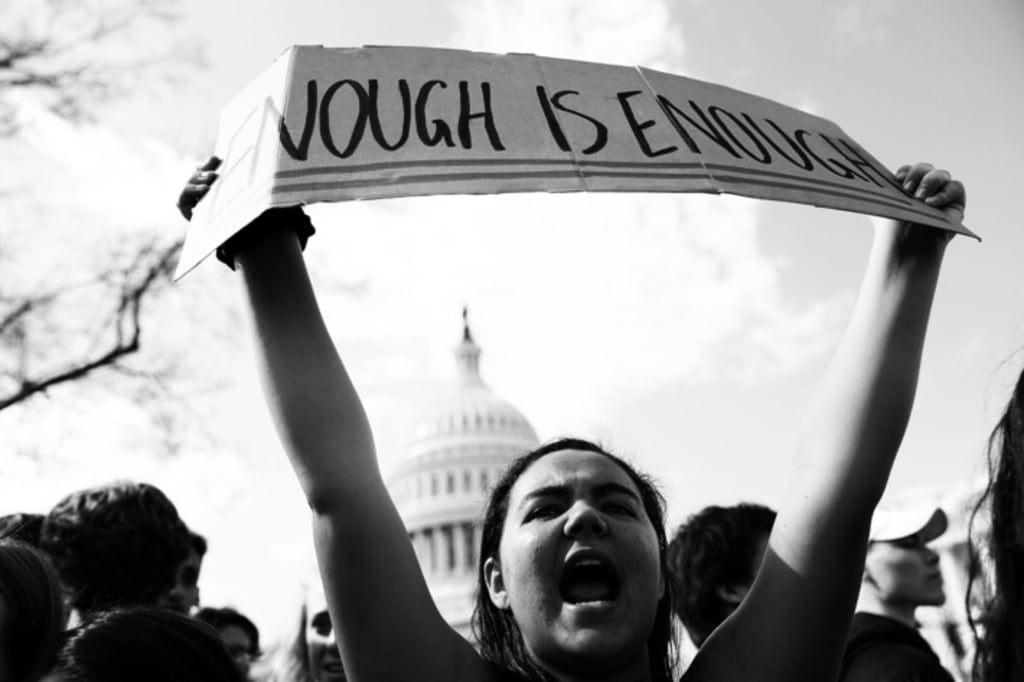University Students on Gun Violence
I sat down with students at Virginia Commonwealth University and interviewed them about recent school shootings. I didn't expect the answers I received.

Richmond, Virginia— Karen sat alone in front of a scaling glass wall, overlooking the heart of Virginia Commonwealth University’s campus. She cautiously warmed her hands with a cup of hot coffee. “You guys have no idea who you just sat down with,” she said, contently. “I graduated from Marjory Stoneman Douglas High School in Parkland. I also went to Virginia Tech, where I survived a mass shooting in 2007.”
Reviewing recent statistics of school shootings shows that the odds of meeting or knowing someone who has been a victim of gun violence has increased exponentially in the last decade. In the first 45 days of 2018, there have already been 18 shootings that have taken place in school buildings across the United States*. One of these shootings occurred Feb. 14, 2018 at Karen’s alma mater, Marjory Stoneman Douglas High School, where 14 children and three staff members were killed. Due to the frequency and relentless reporting of these tragedies, the shock value has started to dissipate among regular social media users. Karen agreed, admitting that social media wasn’t as impactful eleven years ago after the massacre on Virginia Tech’s campus. But now that so many readers rely on social media as their primary news source, school shootings have become “devastatingly mundane” to many.
Kayleigh, a 19-year-old VCU student, grew up in the projects where she said gun violence had been a weekly occurrence. She described it as a “mentality” that she had grown used to before moving to Richmond for college. She then recalled the night that she had been held at gun point on campus and the feeling of shock that soon followed, despite the normalcy of gun violence back home. “It’s our fault that we’re making this the norm,” she said, fidgeting with her fuzzy Patagonia sweater before continuing. “We’re comfortable with violence.”
Millions are still grappling with the hard question of how and why this tragedy occurred. Repeated exposure to violence on television and various social media outlets can cause desensitization, but whether an individual becomes aggressive or violent depends on many factors, such as; the individual’s genetic makeup and their environment. As a Christian, Karen also sees it as an issue of sin. “I believe we all have the capacity to do wrong or do harm. It’s the lack of proper care and attention that plays a big factor in how we sin.”
More specifically, she addressed the lack of accessibility to efficient and affordable mental healthcare for roughly five million American children suffering from mental diseases—such as, bipolar disorder, depression, schizophrenia, and other conditions—that can cause severe life impairment without proper treatment. This fact could be argued as a contributing factor towards the current mass shooting epidemic. However, past studies by the World Psychiatry show that those suffering from a mental illness are more likely to be victims of violence, rather than the perpetrator.
The families of victims and survivors of the school shooting in Parkland, Florida quickly jumped to action after the tragedy by calling on public officials, such as Sen. Marco Rubio and President Donald J. Trump, demanding an investigation and plan of action to fix lax regulations concerning the purchase of firearms. Students and faculty across the nation, inspired by the survivors’ unrelenting strength, took to the streets to march in protest of the National Rifle Association and several of the politicians whose campaigns the organization endorsed. The continued activism was met with backlash from conservative voters, claiming that further gun control would be a violation of the second amendment.
“It’s not about taking away guns,“ Kayleigh said. Her high school had been equipped with armed police officers, allowing Kayleigh and others to feel safer at school. “It’s about preventing more disasters.”
A week after the tragedy, an amendment that would have banned semi-automatic weapons like the one used in Parkland’s shooting, was denied by Florida lawmakers in Tallahassee. Instead, legislation that would raise the legal age required to purchase a firearm to 21 and grant teachers the right to carry openly while in school. This decision was soon criticized, especially by persons of color, who fear that their children’s race would volunteer them as a threat to certain teachers during emergency situations. This proposal will be voted on in the coming days after being pushed through its final committee on Tuesday, February 27.
“I wish there was an immediate solution,” she said, thoughtfully. Karen squeezed her eyes shut and inhaled deeply; her knuckles and fingers, now pale, had not yet moved from her coffee. Finally, with a heavy sigh, she released her grip on the cup, causing the blood to circulate back into her small, freckled hands. “I think that I’m smart enough to at least say that I don’t know what that solution is yet. We’ll just have to see.”
References
Stuart, H. (2003, June). Violence and mental illness: an overview. https://www.ncbi.nlm.nih.gov/pmc/articles/PMC1525086/
* This number also included shootings that were either accidental or self-induced injuries/deaths.
About the Creator
Corrine Fizer
Corrine is an aspiring author/publisher and currently a student at Virginia Commonwealth University in Richmond. She plans to attend Kingston University after graduation to pursue an MA in Creative Writing & Publishing.






Comments
There are no comments for this story
Be the first to respond and start the conversation.